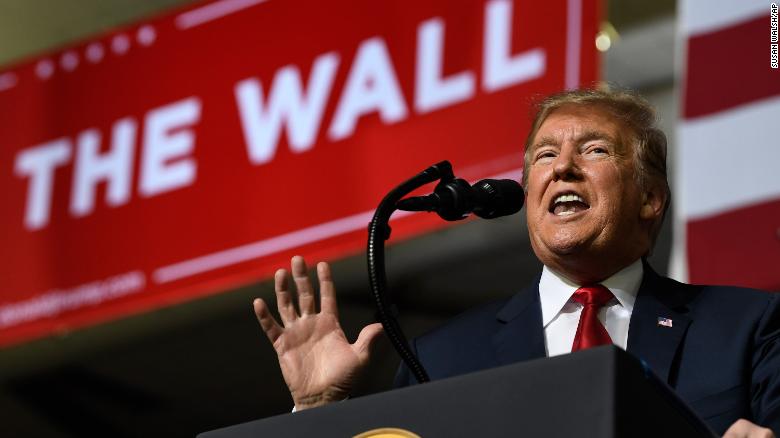
With a simple statement on the Senate floor, Mitch McConnell set a hugely important precedent on the relationship between the legislative and executive branches.
In announcing that President Donald Trump would sign the compromise legislation to keep the government open past Friday, McConnell also expressed support for Trump to declare a national emergency on the border — a move that will allow the chief executive to tap into funds already allocated by Congress for other purposes to bridge the gap between the funding for his border wall in this compromise deal ($1.375 billion) and the amount Trump says he needs ($5.7 billion).
Why does that matter so much? Because what McConnell is doing is effectively ceding Congress’ power to allocate money. He is saying that on this one issue — in order to get what he wants (the government staying open) he is willing to allow Trump to declare a national emergency and, thereby, take money Congress has dedicated to some other purpose to use for something the President considers more of a priority.
“Oh, who cares?” you say. “There are billions of dollars swimming around all over the federal government. What difference does it make if McConnell lets Trump use a few billion that was supposed to be spent elsewhere?”
The Constitution cares. It’s right there in Article 1, Section 9, Clause 7: “No Money shall be drawn from the Treasury but in Consequence of Appropriations made by Law; and a regular Statement and Account of the Receipts and Expenditures of all public Money shall be published from time to time.”
In layman’s terms, that means that while the executive branch can ask for whatever it wants, it’s up to Congress to decide where the money actually goes. And the way they do that is through a series of appropriations bills governing the various parts of the federal government (or, in more recent years, massive omnibus spending packages that roll a series of appropriations bills into one massive spending package).
Now, Trump’s move will be challenged legally. We already know that.
But that doesn’t change the fact that when you break those rules, you open Pandora’s box.
Don’t believe me? Think back to earlier this decade, when then-Senate Majority Leader Harry Reid (Nevada) changed the filibuster rules governing the confirmation of federal judges below the Supreme Court level. Reid did so, as he explained at the time, because Senate Republicans were effectively blockading a massive number of President Barack Obama’s judicial picks. It worked; a bunch of Obama judges made it to the bench.
But then the power in Washington shifted. Trump won the White House. Republicans controlled the Senate.
And not one but two Supreme Court openings occurred. McConnell, citing the precedent established by Reid earlier in the decade, moved to change the rules regarding the confirmation of judges to the nation’s highest court. Rather than 60 votes needed to end debate and move to a final vote, 50 became the new margin. And because Republicans held the majority — and kept their troops largely in line — we now have Supreme Court Justices Neil Gorsuch and Brett Kavanaugh.
That’s why institutionalists — like McConnell before today — are very, very wary of making decisions that might help them or their party in the near-term but could boomerang back against them in the middle- and long-term. For that very reason, McConnell was adamant about his doubts regarding a national emergency declaration to get the wall money Trump said he needed. Trump repeatedly backed off his threats to declare a national emergency on the southern border, talked down — at least in part — by McConnell and other skeptical Republican senators who knew what doing so could mean for the party (and the country) down the line.
What changed McConnell’s mind?
The political consequences of the 35-day government shutdown and the prospects that, without a concession on Trump’s ability to declare a national emergency, another shutdown would inevitably descend at midnight Friday. McConnell is, at heart, a political strategist par excellence. He saw the damage done to the party’s brand from the first shutdown. He knew that a second shutdown — especially one so hard on the heels of the last one — would make those negative impacts exponentially worse.
And so, political strategist McConnell won out over institutionalist McConnell. The prospect of another government shutdown was so noxious to McConnell that he gave in to Trump on something that he knows could come back to bite him and his party down the line. This was, without question, a short-term gain, long-term pain political calculation.
How painful might it be for Republicans? Consider if a Democratic president decides — citing the precedent set by Trump — to declare a national emergency to use previously allocated funds for other purposes to address the threats posed by climate change or guns in America?
“I know the Republicans have some unease about it no matter what they say, because if the President can declare an emergency on something that he has created as an emergency — an illusion that he wants to convey, just think of what a president with different values can present to the American people,” Speaker Nancy Pelosi said Thursday afternoon. “A Democratic president can declare emergencies as well. So the precedent the President is setting here is something that should be met with great unease and dismay by the Republicans.”
As reported by CNN
